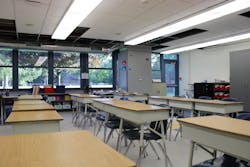Now a Necessity: How the Pandemic Elevated Our Focus on IAQ
By JAKE FELDMAN, Vice President & GM, Modine Manufacturing
Four years ago, the term "indoor air quality" (IAQ) was rarely mentioned. When it was, it was typically to discuss allergens or volatile organic compounds (VOCs). There weren’t many headlines that pushed educational facilities to maintain their HVAC systems, and IAQ topics were not the main conversation on national news programs.
Fast-forward to the present, however, and IAQ is now a major news generator.
When the COVID-19 pandemic struck in the early portions of 2020, concerns were high. Many didn’t know what the virus was or how to combat it within school facilities or other commercial buildings. As stay-at-home orders became the norm across the U.S., the pandemic brought much-needed attention to the importance of IAQ and mechanical HVAC units. With buildings not prepped for the outbreak, many restaurants, movie theaters, and K-12 schools temporarily closed or shut down completely.
Today, with the pandemic still top-of-mind for the foreseeable future, the importance of good IAQ remains front and center for K-12 facilities that want to ensure an in-person, collaborative, and safe environment for both students and staff.
Ventilation and Filtration Needs
In early 2020, when schools began addressing the necessary tools to create a safe learning environment in K-12 facilities, there were two main areas that saw increased focus: ventilation and filtration. For in-person learning to remain an option, schools relied on mechanical HVAC to supply fresh, clean air while improving filtration within classrooms.
IAQ is enhanced through ventilation by bringing fresh outside air into interior spaces. In the process, contaminated air is pushed outside the facility to ensure students and faculty have fresh air to breathe. Thanks to the modern capabilities of HVAC units, facility managers can control how much fresh air is brought into the space to ensure classrooms aren’t overventilated, which could lead to efficiency and humidity control problems.
Also, filtration solutions within HVAC units are typically utilized to minimize the number of particulates in the air. Amid the pandemic, the American Society of Heating, Refrigerating and Air Conditioning Engineers (ASHRAE) Epidemic Task Force recommended that facility managers upgrade to MERV 13 filters if the unit was compatible. Limiting these particulates helped to create cleaner air for students and helped schools inch closer to being better equipped for the ongoing pandemic.
Common Allergies and Viruses
While the pandemic brought to light the need for better IAQ from a COVID point of view, enhanced IAQ also helps to improve everyday air quality issues. Even as daily conversations surrounding COVID have now lessened, seasonal allergens and viruses, such as the flu, are still very prominent. These issues can be problematic, too, when it comes to students staying in school. Just last week in Kentucky, for instance, 14 separate school districts announced that they will be closing or switching back to non-traditional instruction this month due to a high number of influenza cases, according to the Kentucky School Boards Association (KSBA).
With all this mind, filtration and ventilation solutions offer greater potential for HVAC units to successfully minimize the amount of flu and allergen particulates in the air. For improved filtration, K-12 facilities can also incorporate UV lights. According to ASHRAE, “Ultraviolet germicidal energy (UV-C) has been shown to inactivate viruses, bacteria, and fungi.” Combined with filtration solutions within HVAC units, UV-C can play a role in helping to prevent flu viruses from being introduced into a school environment.
Staying In School
Keeping schools open throughout the year should be a main priority for those who want to see students learn and succeed. Nothing can compare to the one-on-one interaction that a student has with their teachers in a collaborative atmosphere.
To ensure students remain in the classroom, it is essential for K-12 school leaders to place a primary focus on creating a safe environment with enhanced IAQ. In addition to reducing the number of allergens, VOCs and viruses, keeping the COVID-19 virus at bay continues to be a primary focus.
Mechanical HVAC units possess the capability to create clean, fresh air through ventilation and filtration solutions. By either upgrading your existing unit or replacing it with a newer model, school leaders can develop an effective plan that focuses on enhanced IAQ. And with cleaner air in the classrooms, HVAC solutions can permit schools to keep classes in session and to avoid cancellations for any type of airborne illness.
##########
Based in Denver, the author is vice president and general manager for Indoor Air Quality at Modine Manufacturing Co. Modine specializes in thermal management systems and components, bringing highly engineered heating and cooling components, original equipment products, and systems to diversified global markets through its four complimentary segments: CIS; BHVAC; HDE; and Automotive. For more information, visit www.modinehvac.com.

